Genre: Sports Developer: Sculptured Software Publisher: Flying Edge Players: 1-2 Released: 1992
WWF Super WrestleMania was the first wrestling video game using the WWF license that was released for 16-bit consoles. Also released on Super Nintendo, Super WrestleMania was developed by Flying Edge (LJN handled the SNES port) and was the first of a trilogy of WWF titles for the Genesis (quadrilogy if you count the Sega CD effort, Royal Rumble).
Whereas the SNES version saw the inclusion of 10 WWF Superstars, here we only see eight. Besides having a lower amount of Superstars, the Genesis had a vastly different array of wrestlers than the SNES did. Genesis players were treated to the likes of Hulk Hogan, Randy Savage, Ultimate Warrior, British Bulldog, Shawn Michaels, Sega-perpetual Papa Shango, Ted DiBiase, and IRS. Meanwhile, if you were playing on the SNES, you were able to command, again, Hogan, Savage and DiBiase, along with The Undertaker, Jake “The Snake” Roberts, Sid Justice, the Legion of Doom (Hawk and Animal), and the Natural Disasters (Earthquake and Typhoon).
Despite the lower number of wrestlers, the Genesis version had one advantage going for it, being that it featured special finishing moves, whereas the SNES version didn’t. Every Superstar in both the SNES and Genesis version of Super WrestleMania shares the same move set except for the finishing moves on the Genesis. While this could have ended up being cool, it’s nothing really to write home about, as all of the moves look pretty goofy. Hogan’s leg drop looks like Kofi Kingston’s Boom Drop, IRS’ Write Off is three frames of leaping confusion, Ultimate Warrior does a tribal dance followed by a shoulder block, Shawn Michaels inexplicably does a slight variation of the vertical suplex already in the game, and British Bulldog’s powerslam could be infamously spammed to easy victory.
Visually, the Genesis version doesn’t look quite as good as its SNES brother. Wrestler-wise, the guys look similar enough, but here on Genesis they feel a little smaller, and with less color. The ring mat itself is solid and unlively, whereas on SNES it has more of a gradient texture to it and animates better. It even has bouncing ropes. And when it comes to a couple little touches, the Genesis falls just a bit short, too. For instance, on the SNES, the ringside commentators (one is certainly Bobby “The Brain” Heenan, whereas I’ve spent a lifetime trying to discern the other: the venerable Gorilla Monsoon? Vince?) animate and gesticulate wildly, whereas they’re static and dull colored on Genesis.
When it comes to gameplay, though, both games are virtually the same. However, the Genesis moves at a much quicker pace, though for the life of me I always found the controls to be unreliably unresponsive when you need them most. I’m unsure if the game utilizes the six-button controllers like its successors did. My gut tells me no but pulling off moves with the regular Genesis controller requires some dual-presses that just don’t work very fluidly.
It’s worth mentioning that the Genesis has a WWF Championship mode, giving the game some moderate single-player replay value (this is absent on the SNES) and for some reason you can exit the ring through the front on Genesis but not on the SNES. If my memory serves me correctly, it was also possible to exit the ring by yourself on the Genesis, but you could only do it if you’d thrown the other opponent out of the ring on SNES – this is just going off memory, however, so don’t hold me to this.
Enough about the comparisons between the two versions, though. How does WWF Super WrestleMania as a whole stack up? Well, it’s got a small roster, albeit of big name favorites of the era (and Papa Shango), but it has a fun “character” to it. Scrolling through the paltry selection of grapplers you’ll hear poor MIDI interpretations of each wrestler’s theme song, and before and after every contest you’ll get some words from Howard Finkle. While it doesn’t necessarily make the game feel “authentic,” you can tell at least a little heart and effort was put into the effort.
Aside from the aforementioned Championship mode, players can duke it out in the obvious one-on-one singles match, a tag team match, or a Survivor Series (four-on-four) match. Due to system limitations of the time, Survivor Series ended up being just a two-on-two match where every time someone’s eliminated, the next person on the team runs out to take his place. Don’t feel too slighted, though, wrestling games still have yet to portray an accurate Survivor Series contest.
Gameplay was undoubtedly done better and more fun in the game’s sequels, WWF Raw and WWF Royal Rumble. If anything, this game feels like a “beta” of those games, and as such you’re really much better off with either of those over this. That being said, though, it still has a certain charm to it, and holds significance in being the first 16-bit WWF game (as well as the only SNES game that featured Hulk Hogan). It’s not a great game by any means, but if you’re a wrestling fan chances are you’ll check out any wrestling game, so give it a look.
SCORE: 7 out of 10

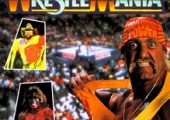
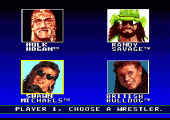
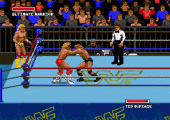
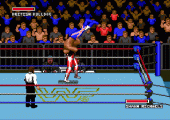
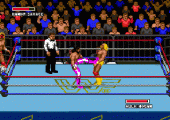
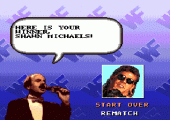
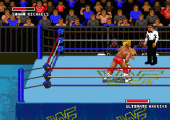
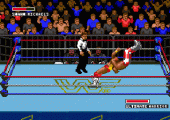
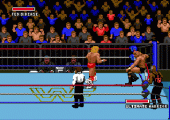
Recent Comments